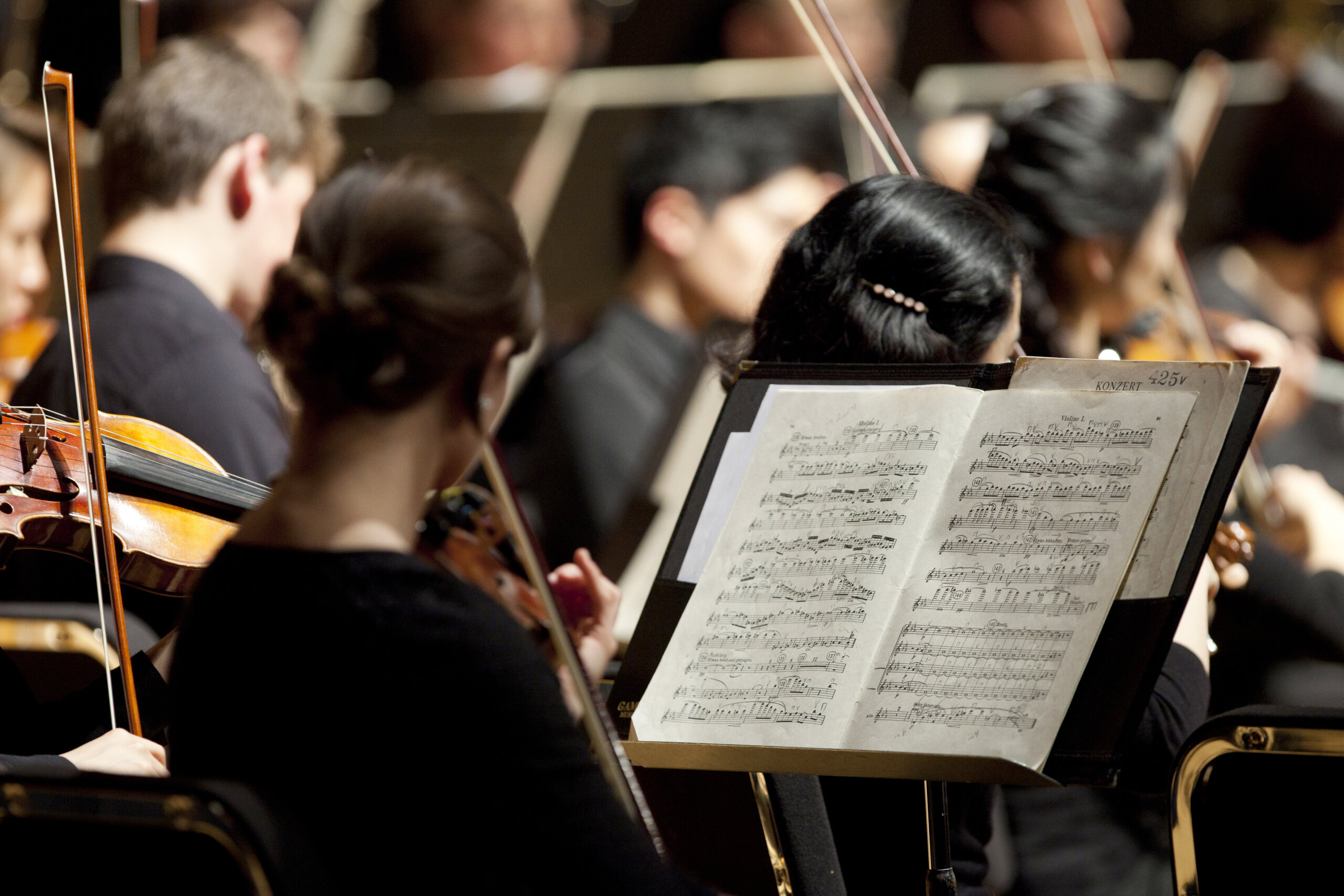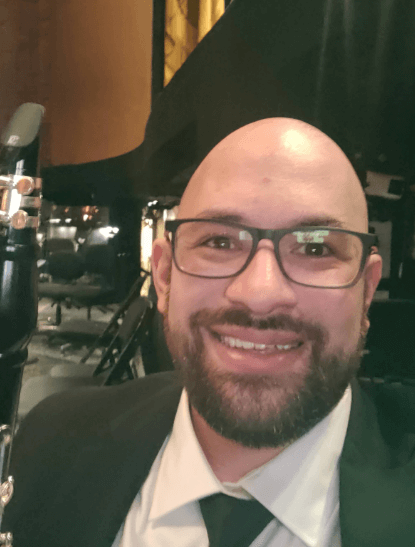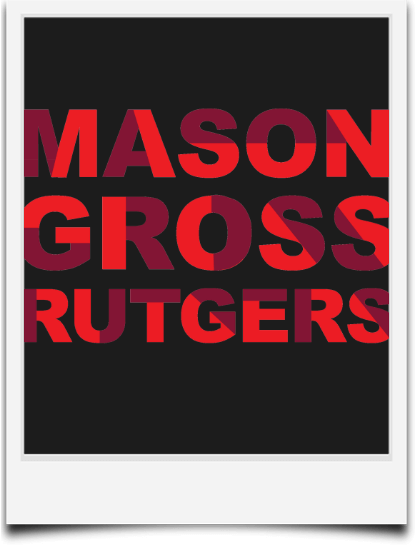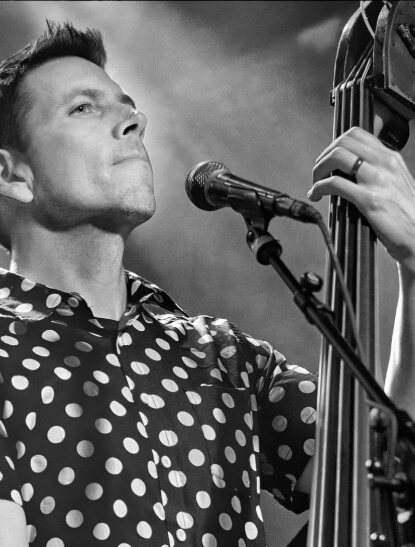
Music
Online Courses
Rutgers Arts Online offers online courses on your schedule. Our list of Music courses are taught by working artists who are experts in their field.
Matriculated and non-matriculated students may take courses through Rutgers Arts Online. Non-matriculated students must complete the Rutgers University application before registering for a course.
Available Courses
07:700:131 Introduction to Music Online
Introduction to Music Online
Course Number: 07:700:131
Course Format: Lecture
Mode of Instruction: Online Asynchronous
This course is divided into three sections. The first covers the fundamentals of music, including sound production, common instruments, the basics of music notation, basic musical materials such as scales and chords, and examines the variety of musical textures. The second section focuses on the way that these materials can be organized including form. The last section focuses on music of other cultures and on ways in which music is used around us, for example, in film and TV, advertisement, cartoons, and in shaping our beliefs. Despite the emphasis on organization and style, there is also a historical component to help the student understand the context of the music he hears and the reasons for change. The course is not limited to classical music, but includes popular styles among the examples. The course is media rich and contains some interactive features.
3 credits
Course Prerequisites and Corequisites: None
Learning Goals of Course
- Develop general scholastic skills such as critical thinking, reading, writing, and listening
- Develop the ability to articulately express opinions in writing, with an emphasis on clarity, persuasion, coherence, and the incorporation of relevant outside sources
- Develop strong organizational and study skills
- Consider the cultural and social significance of music in selected historical and geographic cultures
- Consider specific aspects of both notated and non-notated musical traditions by engaging with outside fields of history, anthropology, and philosophy
- Develop a basic knowledge of music notation, fundamentals of music theory, and musical instruments
- Develop familiarity with some representative composers, musicians, and musical works from selected traditions
- Distinguish significant style features of various historical periods of Western classical music and selected modern musics
Learning Outcomes
By the end of the semester, the student should be able to:
- Analyze musical language and discuss features of the music;
- Relate music to specific histories, values, languages, cultures, and technologies;
- Develop opinions on musical issues and express these with clarity and accuracy.
CORE Curriculum Learning Goals met by this course: Analyze arts and/or literatures in themselves and in relation to specific histories, values, languages, cultures, and technologies (AHp).
Policies for Exams, Assignments, Attendance, and Grading: Grading is based on small homework assignments (25%), two papers (25%), participation in discussion boards (10%), and two exams (40%).
Instructors: Solomon Guhl-Miller, sguhl1@mgsa.rutgers.edu; Myjunglin Oh, mo441@mgsa.rutgers.edu; Rachel Lansang, rlb239@mgsa.rutgers.edu; Jaclyn Moldawsky, jmm992@rutgers.edu
07:700:133 Introduction to Music Theory Online
Intended for students with little or no musical background. As a result, no previous musical experience is required. This course covers the rudiments of music, including pitch, duration, scales, keys, intervals, meter, rhythm and other related areas.
This course may be used to satisfy the theory requirement for the music minor.
3 credits
Note: Students will not receive credit for both Introduction to 07:700:133 and 07:700:103. Students who have successfully completed 121, 122, 221, or 222 may not take this course. SAS Core Code: Critical Creative Expression (AHr)
Instructors:
Robinson McClellan, robinmcc@mgsa.rutgers.edu
Stephen Wilcox, spwilcox@mgsa.rutgers.edu
Jay Dubin, jay.dubin@rutgers.edu
07:700:134 Introduction to Music Theory Online Short Course
This is a compressed, 2-credit course.
This course is intended for students with little or no musical background. As a result, no previous musical experience is required. This course covers the rudiments of music, including pitch, duration, scales, keys, intervals, meter, rhythm and other related areas.
This course may be used to satisfy the theory requirement for the music minor.
2 Credits
Note: Students may receive credit for only one of the following: 07:700:134, 07:700:133 and 07:700:103.
Instructor: Craig Levesque, levesque@mgsa.rutgers.edu
07:700:135 Making Music with Computers: Introduction to Digital Audio Online
Making Music with Computers: Introduction to Digital Audio Online
Course Number: 07:700:135
Course Format: Lecture
Mode of Instruction: Online Asynchronous
This course is an introduction to computer music technology with a focus on creative composition projects. This course is designed to deepen your creative and critical approach to music composition while building a solid foundation for working with digital audio. Topics include acoustics, sound design for video, basic mixing, and an introduction to MIDI. You will gain hands-on experience in sound file editing, DSP techniques, and working with a Digital Audio Workstation (DAW).
3 credits
Course Prerequisites and Corequisites: None
Learning Goals of Course
Upon completion of this course, you will be able to:
- Compose original music using computer music technology by integrating digital audio techniques with the ability to intelligently analyze, interpret, and describe electronic music.
- Demonstrate development of a personal compositional style with a focus on creativity and experimentation. We will complete digital audio assignments and well-crafted compositions while regularly workshop projects for peer and instructor feedback in the Listening Room modules.
- Apply digital audio techniques for modifying and mixing sound using diverse software tools. We will develop these skills through completion of technique-focused software exercises.
- Integrate concepts from electronic music history, repertoire, and current trends through assignments that sharpen listening skills and broaden aural perspective. We will analyze, interpret, and describe musical materials in a wide variety of classic and contemporary electronic music examples.
- Articulate independent thinking about music and explain how technical and musical elements work together in electronic music.
- Apply music industry experience by using online distribution channels (YouTube) to present your original work.
- Build a portfolio of original compositions and effectively present and discuss your work in a public forum.
- Identify yourself as a developing artist and recognize responsibilities of artists in our society by participating in the creative process and engaging in dialogue with the artistic community created by students in the course.
Required and Recommended Course Materials: There is no textbook for the course, but you will need the following materials:
- Purchase Cubase Elements 11 (Links to an external site.) for the educational price of $66.99 (download version).Please note that it may take several days to verify your ID and complete the order, so plan ahead.
- A purchased, licensed version of Cubase Elements is required for the course. You will be asked to demonstrate that you own a license to Cubase Elements 10. The instructor is not able to provide assistance on unlicensed copies of the software.
- Install the following free software: Audacity: http://audacityteam.org/ (Links to an external site.)
- A pair of headphones to plug into your computer or audio interface
- An external hard drive or jump drive to which to back up your work. Storage space of 32GB is recommended.
The MUS 135 course contains online units and lessons with supplementary audio and video, software lessons, technical drills, composition assignment, and a listening response activity. Homework assignments and quizzes take place online. We share will share our creative projects online and discuss using the discussion modules. Interaction with professor Hsu occurs through email.
Policies for Exams, Assignments, Attendance, and Grading:
We will complete a variety of assignments and projects outlined below. Please refer to each assignment for submission guidelines.
Type Points/Percentage
- Quality of Participation and Peer Feedback in Listening Rooms 10%
- Assignments 20%
- "Studio Time" Projects 25%
- Quizzes 20%
- Final Project (YouTube Comments 2% Project 23%) 25%
- TOTAL100%
Instructor: Aurie Hsu, ahsu@mgsa.rutgers.edu
07:700:230 Music in Film Online
Music in Film Online
Course Number: 07:700:230
Course Format: Lecture
Mode of Instruction: Online Asynchronous
This course examines music created for film from both historical and analytical perspectives. The objective is to establish an appreciation for the art of film music, to understand its nature and requirements, and to study the composers and directors who work in the medium. Topics studied will include the functions of the film score, aesthetics, the film industry, synchronization, the early sound film, the rise of the symphonic film score, and composers from the 1930s to the present.
3 credit(s)
Course Prerequisites and Corequisites: None
Learning Goals of Course: Students will cultivate musical perception—developing the ability to discern the function of music in film, the relationship of composers and directors as the work together, as well as, the particular musical characteristics of preeminent film composers past and present. Students will identify various film composers, musical styles, historical relationships, film genres, narrative structure, use of music, cinematic devices such as motives, etc. Students will gain an understanding of the operational aspects of the industry and the resulting development of music written for the movies over the past 100 years.
Learning Outcomes
By the end of the semester, the student should be able to:
- Develop a musical perception—with the ability to discern the function of music in film.
- Acquire an understanding of the operational aspects of the industry and the resulting development of music written for the movies over the past 100 years.
- Students would be able to critically evaluate the relationship between the visual and aural dimensions of film.
Goals will be assessed through tests, threaded discussions, one final project, essays and analytical papers.
Policies for Exams, Assignments, Attendance, and Grading:
Course Assignments
- Discussion Forum (2 points per Unit) = 28 points
- Essays (2) = 15 points each
- Final presentation (1)= 12 points.
- Exams (2): Mid Term= 15 points, Final Exam= 15 points
Instructor: Joseph Turrin, jturrin@mgsa.rutgers.edu
07:700:234 From Jazz to Hip Hop: African American Music in the 20th Century Online
From Jazz to Hip Hop: African American Music in the 20th Century Online
Course Number: 07:700:234
Course Format: Lecture
Mode of Instruction: Online Asynchronous
From Jazz to Hip Hop is designed as an exploration of the relationships between jazz and other African American musical traditions from early 1900s to the present, including blues, R&B, rock, soul and hip hop. The course focuses on the development, evolution, influence and issues of jazz music in America, an exploration that starts with the ephemeral roots of popular African American music in the folk and religious music of the 1800s.
Special attention will be paid to the roles jazz and jazz musicians have played in black popular music and the means by which jazz has helped inform the development of popular American musical styles.
3 credits
Course Prerequisites and Corequisites: None
Learning Goals of Course
Course Goals:
- To understand the historical development of a wide array of African American popular music making traditions and evaluate the impact of social, political and cultural contexts on the production and reception of these 20th century musical genres.
- To develop active/critical listening skills in order to classify sound recordings relevant to the course materials by (sub)genre and likely provenance while making inferences as to the work’s social function and cultural significance.
Course Objectives:
Learning Outcomes
By the end of the semester, the student should be able to:
- Recognize the social, cultural and political conditions under which African American popular music (broadly defined) developed and evaluate how such extra-musical factors contributed to the production and reception of the genre.
- Analyze jazz, blues, R&B, soul, hip-hop and related recordings, identifying general musical characteristics, genre-specific performance styles, and likely historical period.
Policies for Exams, Assignments, Attendance, and Grading
List and describe each assignment below.
- Song Presentation Assignment - Two-three paragraph personal reflection about a course-related song of your choosing. This project doubles as an introduction to uploading media in the Canvas Learning Management System
- Artist Profile Project - An online artist profile of the course-related artist of your choice. The project includes a researched historical overview/critique of a musician/group and a song/album analysis.
- Two Exams - held at the conclusion of units 5 & 9
- Discussion Forum Posts - Contribute to required discussion forums in units 2-7 and 9.
Final Grade Calculation
- 50 points / 9.1% Song Presentation
- 150 points / 27.3% Artist Profile
- 100 points / 18.2% Exam 1
- 100 points / 18.2% Exam 2
- 150 points / 27.3% Discussion Forums
- 550 points / 100%TOTAL
Instructor: Sean Lorre, sjlorre@mgsa.rutgers.edu
07:700:235 Rock ‘N’ Roll: Origins to Present Online
Rock ‘N’ Roll: Origins to Present Online
Course Number: 07:700:235
Course Format: Lecture
Mode of Instruction: Online Asynchronous
How does a musical genre such as rock become a cultural force bringing about social, sartorial, and political change? How does our sense of identity—race, gender, class, etc.—influence the music we listen to? What roles do technology and commerce play in shaping local and global ideas of popular music? In short, how and why did rock ‘n’ roll transform the world?
This class broadly explores the history of rock music from a wide array of perspectives, covering the period from its early beginnings to rockabilly, soul, metal, punk, and many other subgenres throughout the second half of the 20th century.
3 credits
Course Prerequisites and Corequisites: None
Learning Goals of Course:
Course Goals:
- To understand the historical development of rock 'n' roll and evaluate the impact of social, political and cultural contexts on the production and reception of one of the most popular and influential musical genres of the twentieth century.
- To develop active/critical listening skills in order to classify rock and pre-rock recordings by (sub)genre and likely provenance while making inferences as to the work’s social function and cultural significance.
Course Objectives:
Learning Outcomes
By the end of the semester, the student should be able to:
- Recognize the social, cultural and political conditions under which rock 'n' roll (broadly defined) developed and evaluate how such extra-musical factors contributed to the production and reception of the genre.
- Analyze pre-rock, rock 'n' roll and related recordings, identifying general musical characteristics, genre-specific performance styles, and likely historical period.
Policies for Exams, Assignments, Attendance, and Grading:
Course Assignments
- Song Presentation Assignment - Two-three paragraph personal reflection about a rock-related song of your choosing. This project doubles as an introduction to uploading media in the Canvas Learning Management System
- Artist Profile Project - An online artist profile of the rock or rock-related artist of your choice. The project includes a researched historical overview/critique of a musician/group and a song/album analysis.
- Two Exams - held at the conclusion of units 4 and 8
- Discussion Forum Posts - Contribute to required discussion forums in units 2–8.
Course Grading
Grading is based on the assignments
- Song Presentation - 30 pts
- Artist Profile - 150 pts
- Exam 1 - 100 pts
- Exam 2 - 100 pts
- Discussion Forums - 170 pts
Instructors:
Sean Lorre, sjlorre@mgsa.rutgers.edu
Farley Miller, fmiller@mgsa.rutgers.edu
Matt Brounley, db1394@mgsa.rutgers.edu
07:700:239 Rock ‘N’ Roll: Origins to Present Online Short Course
Rock ‘N’ Roll: Origins to Present Online Short Course
Course Number: 07:700:239
Course Format: Lecture
Mode of Instruction: Online Asynchronous
This is a compressed, 2-credit course.
How does a musical genre such as rock become a cultural force bringing about social, sartorial, and political change? How does our sense of identity—race, gender, class, etc.—influence the music we listen to? What roles do technology and commerce play in shaping local and global ideas of popular music? In short, how and why did rock ‘n’ roll transform the world?
This class broadly explores the history of rock music from a wide array of perspectives, covering the period from its early beginnings to rockabilly, soul, metal, punk, and many other subgenres throughout the second half of the 20th century.
2 credits
Course Prerequisites and Corequisites: None
Learning Goals of Course:
Course Goals:
- To understand the historical development of rock 'n' roll and evaluate the impact of social, political and cultural contexts on the production and reception of one of the most popular and influential musical genres of the twentieth century.
- To develop active/critical listening skills in order to classify rock and pre-rock recordings by (sub)genre and likely provenance while making inferences as to the work’s social function and cultural significance.
Course Objectives:
Learning Outcomes
By the end of the semester, the student should be able to:
recognize the social, cultural and political conditions under which rock 'n' roll (broadly defined) developed and evaluate how such extra-musical factors contributed to the production and reception of the genre.
analyze pre-rock, rock 'n' roll and related recordings, identifying general musical characteristics, genre-specific performance styles, and likely historical period.
Policies for Exams, Assignments, Attendance, and Grading:
Course Assignments
List and describe each assignment below.
- Song Presentation Assignment - Two-three paragraph personal reflection about a rock-related song of your choosing. This project doubles as an introduction to uploading media in the Canvas Learning Management System
- Artist Profile Project - An online artist profile of the rock or rock-related artist of your choice. The project includes a researched historical overview/critique of a musician/group and a song/album analysis.
- Two Exams - held at the conclusion of units 3 and 6
Discussion Forum Posts - Contribute to required discussion forums in units 2–5.
Course Grading
Grading is based on the assignments
- Song Presentation - 50 pts
- Artist Profile - 150 pts
- Exam 1 - 100 pts
- Exam 2 - 100 pts
- Discussion Forums - 160 pts
Instructor: Matt Brounley, db1394@mgsa.rutgers.edu
07:700:241 Studies in World Music Online
Studies in World Music Online
Course Number: 07:700:241
Course Format: Lecture
Mode of Instruction: Online Asynchronous
Studies in World Music focuses on introducing and surveying the music of diverse societies and cultures of the world using social and cultural theories and ethnomusicological methodologies as a framework. Throughout this course, students will explore the idea of “world music” in various social, cultural, and aesthetic contexts. To understand music as culture in the modern world, we must examine music in its various social functions and roles, as well as its theoretical components. The goal of this course is to cultivate an informed, critical, and sensitive understanding of music in the modern world. The purpose of this course is to serve as an introduction to and survey of the music of various societies throughout the world.
3 credits
Course Prerequisites and Corequisites: None
Learning Goals of Course: The goal of this course is to cultivate an informed, critical, and sensitive understanding of music in the modern world.
Course Objectives: In this course, the primary aspects of music will be discussed including: the contexts and occasions for music making; the social organization and functions of music, and; the oral, written, and mass mediated transmissions of music in the modern world. Fundamental aspects of sound—including pitch, phonic structure, rhythm and meter, texture, form, and expression—are identified and explained. Specific case studies are chosen in order to illustrate a wide range of musical expressions and related social issues. Knowledge will be acquired through the utilization of recordings, videos, readings and live performances.
Learning Outcomes
Upon completion of this course students will have demonstrated that they:
- Can use the appropriate musical/ethnomusicological terminology when analyzing and describing a variety of musics within social and cultural contexts.
- Explain how music is characteristic of the people who make it, and how they use it in the modern world.
understand the ways in which music is linked to sociocultural issues such as spirituality, politics, class, identity formation, and other theoretical constructs.
You do not have to be able to read music to understand the material in this course.
Policies for Exams, Assignments, Attendance, and Grading
Course Assignments:
- Discussion: Please Introduce Yourselves (5 points)
- Acknowledgement of Course Policies (5 points)
- Exam #1 (60 points)
- Exam #2 (60 points)
- Exam #3 (60 points)
- Exam #4 (60 points)
- Research Paper (90 points)
- Discussion Post #1 (40 points)
- Discussion Post #2 (40 points)
- Discussion Post #3 (40 points)
- Discussion Post #4 (40 points)
- 500 points TOTAL
Instructor: Ruth M. "Sunni" Witmer, rw482@mgsa.rutgers.edu
07:700:242 Country Music: A Cultural and Musical Survey Online
Country Music: A Cultural and Musical Survey Online
Course Number: 07:700:242
Course Format: Lecture
Mode of Instruction: Online Asynchronous
Country music has been part of American popular culture for close to 100 years. From the fiddle tunes and blue yodels of the 1920s to the Americana revival and “hick-hop” of today, music associated with rural American life has fascinated and entertained. Moreover—despite its roots in obscure, rural Southern and Western folk song—country music has become one of the most commercially successful music styles of the past decade.
In this introductory-level elective course, students will cultivate critical thinking and analysis skills through the study of country music’s historical development. Following a detailed examination of the genre’s formation and popular trajectory over the course of the twentieth century, the course concludes with a thorough investigation of the cultural, social and musical implications of country music’s 21st-century resurgence.
3 credits
Course Prerequisites and Corequisites: None
Learning Goals of Course
Course Goals:
- Students will gain an understanding of the historical development of country music.
- Students will develop engaged listening skills in order to classify country music recordings by (sub)genre and provenance.
- Students will develop an ability to think critically about the impact of social, political and cultural contexts on the production and reception of country music.
Course Objectives:
Learning Outcomes
By the end of the semester, the student should be able to:
- Discuss the historical trajectory of country music from its origins to present-day trends.
- Recognize the social, cultural and political conditions under which country music (broadly defined) developed.
- Evaluate how extra-musical factors contributed to the production and reception of country music.
- Analyze country music recordings, identifying general musical characteristics, genre-specific performance styles, and historical period.
- Make inferences as to a country music recording’s likely social function and cultural significance based on elements of musical style.
- Conduct basic online research from a select group of resources (Country Music Hall of Fame and Museum Digital Archive, Library of Congress Digital Archive, ProQuest Historical Newspapers Archive, America: History and Life, American Radio History Archive, etc.).
- Create an online, multimedia presentation in the Canvas Learning Management System.
Policies for Exams, Assignments, Attendance, and Grading:
Grading is based on the assignments:
- Song Presentation-10%
- Artist Profile Online Presentation-24%
- 3 Quizzes-36% (total)
- Discussion Forums-30%
Final Grade Calculation (Points/Percentage Type)
- 100 points / 10% Song Presentation Project
- 200 points / 24% Artist Profile Online Presentation
- 100 points / 10% Quiz 1 (units 1 & 2)
- 100 points / 10% Quiz 2 (units 3 & 4)
- 160 points / 16% Quiz 3 (units 5-7)
- 240 points / 30% Discussion Forums (6 forums, 50 pts each)
- 1000 points / 100% TOTAL
Instructor: Sean Lorre, sjlorre@mgsa.rutgers.edu
07:700:243 Divas, Devils, and Drama: A History of Opera and Musical Theater Online
Divas, Devils, and Drama: A History of Opera and Musical Theater Online
Course Number: 07:700:243
Course Format: Lecture
Mode of Instruction: Online Asynchronous
This course is an introduction to the operatic genre from the 17th century to the present day. Tracing opera’s history from the musical intermezzi of Florence, Italy, to the innovative and experimental productions heard around the world today, this course explores how opera serves as a lens through which a variety of cultural, performative, and historical issues may be examined.
3 credits
Course Prerequisites and Corequisites: None
Learning Goals of Course: The aim of this course is to trace the development of the music drama in terms of its stylistic and compositional characteristics and goals, and to examine its ability to communicate meaning through music, text, and performance. The course will consider the historical context of various creators, performers, and listeners of opera and musical theater.
Course Objectives
The specific objectives to be achieved through this course are:
- Demonstrate understanding of the historical circumstances surrounding the emergence and development of opera and musical theater.
- Demonstrate understanding of major elements of operatic style, conventions, and compositional techniques as they have evolved over the course of 450 years.
- Be prepared to view, understand, and contextualize performances.
- Employ critical thinking skills in order to synthesize issues concerning operatic composition, performance, and reception within larger artistic, social, and political contexts.
Learning Outcomes
After participating in this course, the student will be able to:
- Utilize a common vocabulary for speaking and writing about opera, musical theater, and music-making more broadly.
- Describe the trajectories of operatic style, major schools, and performance contexts.
- Identify major composers and relevant musical works.
- Evaluate operatic performances based on the goals, stylistic conventions, and content of various musical styles through the development of critical listening skills.
Policies for Exams, Assignments, Attendance, and Grading:
Grading
- Written Assignments 30 points (3 at 10 points each)
- Discussion Forum Participation 15 points
- Midterm Exam 25 points
- Final Exam 30 points
- TOTAL 100 points
Instructor: Rachael Leigh Lansang, rlb239@mgsa.rutgers.edu
07:700:244 Global Popular Music Online
Global Popular Music Online
Course Number: 07:700:244
Course Format: Lecture
Mode of Instruction: Online Asynchronous
This course will explore the popular music of various societies from around the world, and how it is created and transformed by cultural and musical influences from other societies and world views when they encounter and interact with one another. Students will examine the artistic, cultural, and socioeconomic effects of global popular music. Topics of inquiry include hybridity and diversity in music; the effects of globalization on musical/cultural development; and the social, political, and cultural ramifications resulting from expressive cultural forms expanding around the world, both historically and currently.
3 credits
Course Prerequisites and Corequisites: None
Learning Goals of Course: To understand music as culture in the modern world, we must examine it in its various social functions and roles, as well as its theoretical components. The goal of this course is to cultivate an informed, critical, and sensitive understanding of global popular music and its roles and functions in the modern world.
Course Objectives
In this course, the primary aspects of popular music from all over the world are presented. Course objectives include:
- Understanding musical/ethnomusicological terminology and using it to analyze and describe popular music within musical, social, and cultural contexts;
- Analyzing the roles and functions of popular music within the social organization of societies, and the contexts and occasions for popular music making around the world;
- Examining the oral, written, and mass mediated transmissions of popular music in a global environment.
Fundamental aspects of sound—including pitch, phonic structure, rhythm and meter, texture, form, and expression—are identified and explained. Specific case studies are chosen in order to illustrate a wide range of musical expressions and related social issues. Knowledge will be acquired through the utilization of recordings, videos, readings, and live performances.
Learning Outcomes
Upon completion of this course students will have demonstrated that they can:
- Use appropriate musical/ethnomusicological terminology when analyzing and describing popular music within musical, social, and cultural contexts;
- Recognize and realize the roles and functions of popular music within the social organization of societies, and the contexts and occasions for popular music making around the world;
- Understand the ways in which popular music is created and consumed through its oral, written, and mass mediated transmissions in a global environment.
Policies for Exams, Assignments, Attendance, and Grading:
Course Assignments
- Exam #1
- Exam #2
- Exam #3
- Exam #4
- Research Paper
- Experiential Learning Event Project (Note: The Experiential Learning Event Project assignment will be suspended due to the COVID-19 pandemic.)
- Online Discussion Post #1
- Online Discussion Post #2
- Online Discussion Post #3
- Online Discussion Post #4
Instructor: Ruth M. "Sunni" Witmer, rw482@mgsa.rutgers.edu
07:700:293 Introduction to Jazz Improvisation Online
Introduction to Jazz Improvisation Online
Course Number: 07:700:293
Course Format: Lecture
Mode of Instruction: Online Asynchronous
Introduction to Jazz Improvisation covers the basic harmonic structures underlying melodic jazz improvisation. During the course the student will be introduced to both the vertical (chord spellings including tensions) and horizontal (diatonic) harmonic structures found in many types of western music; including classical, jazz, hip hop, folk, pop, rock gospel, and other popular musical forms.
The student will learn to improvise with these 3 and 4 note structures and apply there use over common chord progressions. Each online lesson includes a detailed video explanation, a written description, as well as supplemental audio play-along material.
3 credits
Course Prerequisites and Corequisites: None
Learning Goals of Course
Course Learning Objectives:
- To demonstrate a theoretical understanding of major, minor, dominant “vertical” harmonic spelling
- Including altered dominant spellings such as b9, #9, #11, #5, 13.
- To demonstrate a basic ability to improvised from a major pentatonic scale in all 12 keys.
- To develop a strong relative pitch allowing for the recognition of intervals and harmonic tensions by ear, without the use of an instrument.
- To be able to improvise over a standard jazz progression (Autumn Leaves) using the concepts outlined in the course.
- To understand the basics of the ii – V – I progression both vertically and horizontally (modes and key centers).
- To fully understand the numerical analysis of common harmonic structures in all 12 keys.
Required and Recommended Course Materials:
Policies for Exams, Assignments, Attendance, and Grading:
Time and Workload: Students should expect to spend up to 6 hours each week working with each of the online lessons. Reading the description, watching the video, practicing and digesting the material using the PDF’s, Drum and Bass play along tracks, drones and other included materials. Discussion with other students can take place at the Piazza online forum, weekly homework assessment and midterm and final examinations will be arranged during virtual office hours with the professor, through video chat or email.
Reading/Listening: Lessons with embedded audio/video: 1-2 hours/week
Homework Assignments (HW): Performance of lesson concept and written test when relevant.
Projects: Written and improvised melodic ideas over specific harmonic structures – progressions or individual chords (modal).
Exams: Chord spelling, chord performance including triads in all inversions and with single note embellishment both diatonic and non-diatonic tensions and pentatonic and modal improvisation.
Instructor: Michael Noordzy, noordzy@mgsa.rutgers.edu
07:700:310 The Business of Music Online
The Business of Music Online
Course Number: 07:700:310
Course Format: Lecture
Mode of Instruction: Online Asynchronous
This course covers the fundamentals of the music industry from a variety of perspectives including major record labels and publishers, independent musicians and labels, managers, attorneys, and agents. Furthermore, students will gain entrepreneurial experience recording their own work and releasing/promoting it to the on-line community. There will also be some brief discussion about musician finances, job/internship acquisition/promotion, resume writing, and career building. This is the new online version of the former face-to-face class.
3 credits
Course Prerequisites and Corequisites: None
Learning Goals of Course:
- To gain a broad understanding of music publishing including the departments of a major music publisher and how they interact with one another, copyright definitions/enforcement/filing criteria (including the rights granted when one creates a copyrightable work), and the various income types with a focus on mechanical licensing procedures including statutory rate and royalty calculations.
- To learn how to register as both a writer and publisher with one of the major performing rights organizations (ASCAP or BMI) in order to be eligible to receive performance royalties for their musical works.
- To gain a broad understanding of record company operations including the departments of a major record label and how they interact with one another, learn about the different types of recording contracts, and be able to generate royalty statements for artists, producers, and/or publishers.
- To understand the way an artist’s personal team of advisors coordinates in order to enhance and further the artist’s career. We will discuss the responsibilities of the personal manager, business manager, attorneys, and agents.
- To be able to write an effective artist’s biography as part of an overall marketing strategy as well as developing a web presence through traditional and social media.
- To develop professional speaking and negotiation skills.
- To learn how to release their own independent recording through available digital outlets and begin to develop a following from the ground up.
- To be able to write an effective resume.
Course Objectives: Students will demonstrate through participation in class discussions, presentations, projects, and tests their growing business acumen and ability to complete tasks in a timely basis.
Policies for Exams, Assignments, Attendance, and Grading:
Final Grade Calculation:
- 30% Homework Assignments & Participation
- 10% Copyrights & Music Publishing Test
- 15% Mid-Term Examination15%Final Examination (cumulative)
- 30% Final Project, split into four pieces:
- Completing your recording (25%)
- Obtaining artwork for your project (25%)
- Releasing your project to Spotify and other digital services through a 3rd party digital aggregator. This will cost you approximately $15. Please do not sign up for any so-called "premium" services. (25%)
- Either:
- Original work: registering with either ASCAP or BMI as both a publisher and a songwriter. This will cost you approximately $100. (25%)
- Cover song: obtaining a mechanical license from the publisher. This will cost less than $100. (25%)
Instructor: Christopher Opperman, cdo25@mgsa.rutgers.edu
07:700:389 Inclusive Learning in Music Online
Inclusive Learning in Music Online
Course Number: 07:700:389
Course Format: Lecture
Mode of Instruction: Online Asynchronous
Skills and techniques for teaching music to diverse student populations. Emphasis is on neurological, physical, and behavioral diversity, but other aspects of student diversity are also addressed. Strategies for teaching music in both inclusive and self-contained music classrooms.
3 credits
Learning Goals of Course
Course Objectives:
- Demonstrate awareness of the political, social, and historical contexts of special education.
- Be prepared to work as a music educator within an inclusive and collaborative educational structure.
- Develop a keen awareness of, and strong commitment to, teaching the full range of learners with disabilities.
- Anticipate high-priority needs, as well as effectively teach and make routine accommodations for students with Individualized Education Programs (IEPs) and 504 plans.
Course Learning Outcomes:
- After completing this music education course, students will be able to:
- Demonstrate knowledge of Public School Education and the challenges encountered in providing an equal opportunity for all students.
- Consider the current structure of special education and a brief history of legislation and litigation in the United States relevant to special education.
- Examine the process of fieldwork with students who have special needs.
- Obtain competencies necessary for appropriate and meaningful engagement with students whoha ve special needs in K-12 music classrooms.
- Adopt a paradigm of student centered and inclusive classrooms.
- Describe curriculum and assessment for students with special needs.
- Identify appropriate teaching strategies for performers with special needs.
- Identify teacher and student dispositions and qualities when teaching students who are intellectually gifted or twice exceptional.
Required and Recommended Course Materials: Hammel, A.M. & Hourigan, R.M. (2017). Teaching Music to Students with Special Needs: A Label-Free Approach (second edition). New York. Oxford University Press.
Hammel, A.M. (2017). Teaching Music to Students with Special Needs: A Practical Resource. New York. Oxford University Press.
Policies for Exams, Assignments, Attendance, and Grading:
Course Assignments and Grading Policy
- Weekly Projects 40%
- Final Project (Case Study) 25%
- Class Participation (comments to peers on projects) 15%
- Discussion Question Completion 20%
- TOTAL 100%
Your Final Grade will be weighted with each assignment counting as a percentage of the total grade.
Instructor: Alice M. Hammel, ah1029@mgsa.rutgers.edu




















